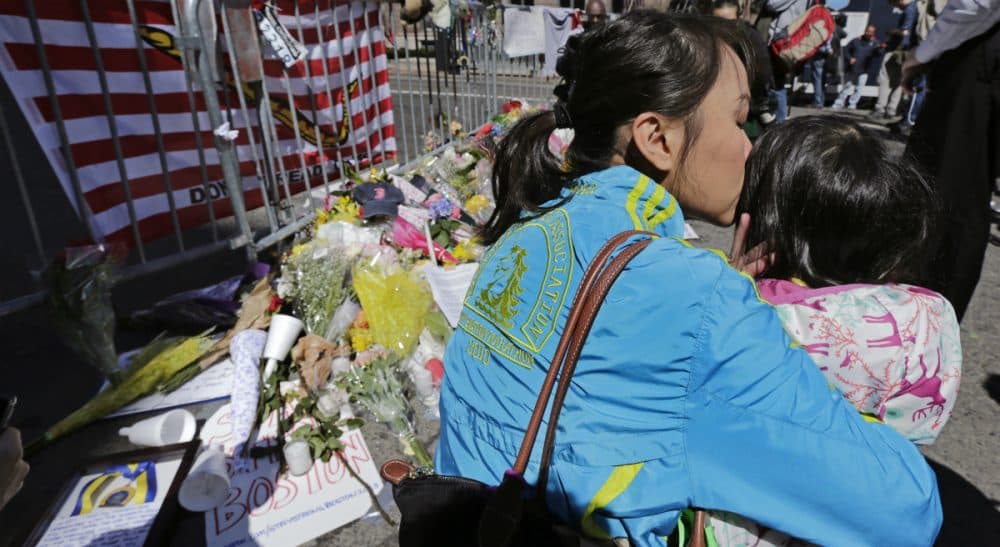Advertisement
The Nature Of Worry

As a kid, I loved Mad Magazine. And I cracked up every time I saw Alfred E. Neuman ask the eternal question: "What, me worry?"
Because, you know, how hilarious! Not worrying? What in the world was that? Ha!
Either you’re born a worrier, like me, or having kids turns you into one. But in a twist I would not have expected, evolving as a parent actually led this worrywart to lighten up.
I’ve pondered that a lot in the past year, as my thoughts have turned to the Boston Marathon bombing.
My reflections on anything related to this subject are trivial, compared to the consequences for the people hit hard. They’re dealing with the searing pain of grief and loss, the physical and emotional aches of tragedy, the challenges of moving forward after mayhem.
I’m at a safe distance, looking for lessons. And I keep coming back to the nature of worry.
Now that we’re a year on from the violence marring one of the sweetest days on the calendar, I find myself revisiting the fretful conversations that surrounded me in the days after the attack:
If you aren’t safe at the Marathon, then where are you safe?
Is it possible to protect your family anywhere?
When you’re waiting for the other shoe to drop, you might not see the banana peel by the cliff, and even if you do... a piano could still fall from the sky.
Similar refrains occur with depressing regularity as innocents are murdered while they are going to school, or working or shopping.
And the answer, of course, is that we cannot guard against all evil all the time.
But I think the impulse to do so, especially for our children, feeds a common habit of pre-emptive worrying.
I’m not speaking of people with genuine mental health issues around anxiety or OCD. But some of the rest of us get bogged down in this spiral of magical thinking: if I worry about it, then it won't happen. Which, as irrational as it already is, leads to a related set of irrational worries. What if I don’t worry about that specific calamity? Might it, therefore, come to pass?
In this approach, worrying is incorporated as a talisman, warding off danger and disaster.
I know this, because I used to do it, and I’ve witnessed it in plenty of others — especially the parents of young children.
Advertisement
It is, however, folly. It represents a flailing effort to gain, or to pretend to gain, some power over the unpredictable comings and goings of life.
But we can’t. And that’s not all.
When you’re waiting for the other shoe to drop, you might not see the banana peel by the cliff, and even if you do... a piano could still fall from the sky.
The impossibility of averting all harm doesn’t mean we give up and exercise no caution. We should use our common sense, be careful, protect the vulnerable and evaluate risk. But as parents we should also remember that pre-emptive worrying can cause at least as many problems as we would hope for it to prevent.
I am grateful that I picked up on some of this early in my tenure as a parent — even as I was nonsensically overprotective in other ways (although there’s no truth to the rumor that by the time I let my boys walk to the store alone they were old enough to buy beer). Primarily, I gathered that bringing up children in an atmosphere pervaded by this level of concern does them no favors. It constricts their lives and thwarts their wellbeing — the exact opposite of the intended effect of superstitious worrying.
Savoring the present became my mantra. It came down to this: how can I 'be here now' if I’m all worked up over later?
Also: why borrow trouble from tomorrow? Kids grow and change so quickly that when mine were infants I learned to live in and cherish the moment. Savoring the present became my mantra. It came down to this: how can I “be here now” if I’m all worked up over later? Sure, I could sit around and dream up possible catastrophes in the future, as my delusional inoculation against the worst. But at what cost?
I nipped my preemptive worrying habit in the bud by imagining the wrath of my future self — she’d be cursing me a blue streak for wasting the precious time with my sons I could never reclaim, letting the beautiful and joyful present slip away into fruitless distress.
Not to say I ever became Adventure Mom. Reckless abandon is not my calling card. The Albert E Neuman approach is still comically foreign. I mean, to the naked eye, I’m a worrywart to this very second. But compared to what I could have been — progress! And I wish the same evolution for moms and dads just starting out. Even though my sons are grown, I’m still learning a lot about this parenting gig. And that, as the cliché reminds us, is not a sprint but a marathon.
Related:
